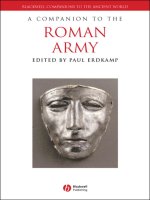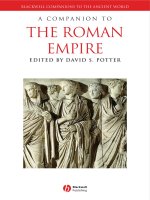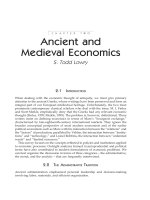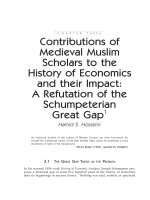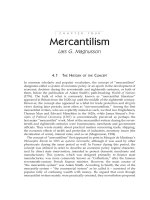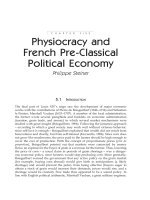a companion to the roman army
Bạn đang xem bản rút gọn của tài liệu. Xem và tải ngay bản đầy đủ của tài liệu tại đây (7.98 MB, 601 trang )
A COMPANION
TO
THE ROMAN ARMY
ACTA01 8/12/06 11:10 AM Page i
BLACKWELL COMPANIONS TO THE ANCIENT WORLD
This series provides sophisticated and authoritative overviews of periods of ancient history, genres of classical lit-
erature, and the most important themes in ancient culture. Each volume comprises between twenty-five and
forty concise essays written by individual scholars within their area of specialization. The essays are written in a
clear, provocative, and lively manner, designed for an international audience of scholars, students, and general
readers.
A Companion to the Classical Greek World
Edited by Konrad H. Kinzl
A Companion to the Ancient Near East
Edited by Daniel C. Snell
A Companion to the Hellenistic World
Edited by Andrew Erskine
Ancient History
Published
A Companion to the Roman Army
Edited by Paul Erdkamp
A Companion to the Roman Republic
Edited by Nathan Rosenstein and
Robert Morstein-Marx
A Companion to the Roman Empire
Edited by David S. Potter
In preparation
A Companion to Ancient History
Edited by Andrew Erskine
A Companion to Archaic Greece
Edited by Kurt A. Raaflaub and Hans van Wees
A Companion to Julius Caesar
Edited by Miriam Griffin
A Companion to Late Antiquity
Edited by Philip Rousseau
A Companion to Byzantium
Edited by Elizabeth James
Literature and Culture
Published
A Companion to Catullus
Edited by Marilyn B. Skinner
A Companion to Greek Religion
Edited by Daniel Ogden
A Companion to Classical Tradition
Edited by Craig W. Kallendorf
A Companion to Roman Rhetoric
Edited by William Dominik and Jon Hall
A Companion to Greek Rhetoric
Edited by Ian Worthington
A Companion to Ancient Epic
Edited by John Miles Foley
A Companion to Greek Tragedy
Edited by Justina Gregory
A Companion to Latin Literature
Edited by Stephen Harrison
In preparation
A Companion to Classical Receptions
Edited by Lorna Hardwick
A Companion to Ancient Political Thought
Edited by Ryan K. Balot
A Companion to Classical Studies
Edited by Kai Brodersen
A Companion to Classical Mythology
Edited by Ken Dowden and Niall Livingstone
A Companion to Greek and Roman Historiography
Edited by John Marincola
A Companion to the Ancient Greek Language
Edited by Egbert Bakker
A Companion to Hellenistic Literature
Edited by Martine Cuypers and James J. Clauss
A Companion to Roman Religion
Edited by Jörg Rüpke
A Companion to Ovid
Edited by Peter Knox
A Companion to Horace
Edited by N. Gregson Davis
ACTA01 8/12/06 11:10 AM Page ii
A COMPANION
TO THE
ROMAN ARMY
Edited by
Paul Erdkamp
ACTA01 8/12/06 11:10 AM Page iii
© 2007 by Blackwell Publishing Ltd
blackwell publishing
350 Main Street, Malden, MA 02148-5020, USA
9600 Garsington Road, Oxford OX4 2DQ, UK
550 Swanston Street, Carlton, Victoria 3053, Australia
The right of Paul Erdkamp to be identified as the Author of the Editorial Material
in this Work has been asserted in accordance with the UK Copyright, Designs,
and Patents Act 1988.
All rights reserved. No part of this publication may be reproduced, stored in a
retrieval system, or transmitted, in any form or by any means, electronic, mechanical,
photocopying, recording or otherwise, except as permitted by the UK Copyright,
Designs, and Patents Act 1988, without the prior permission of the publisher.
First published 2007 by Blackwell Publishing Ltd
1 2007
Library of Congress Cataloging-in-Publication Data
A companion to the Roman army / edited by Paul Erdkamp.
p. cm.
Includes bibliographical references and index.
ISBN-13: 978-1-4051-2153-8 (hardback : alk. paper)
ISBN-10: 1-4051-2153-X (hardback : alk. paper) 1. Military history, Ancient.
2. Rome—History, Military. 3. Rome—Army. I. Erdkamp, Paul.
U35.C648 2007
355.00937—dc22
2006009420
A catalogue record for this title is available from the British Library.
Set in 10/12pt Galliard
by Graphicraft Limited, Hong Kong
Printed and bound in Singapore
by Markono Print Media Pte Ltd
The publisher’s policy is to use permanent paper from mills that operate a sustainable
forestry policy, and which has been manufactured from pulp processed using acid-free
and elementary chlorine-free practices. Furthermore, the publisher ensures that
the text paper and cover board used have met acceptable environmental
accreditation standards.
For further information on
Blackwell Publishing, visit our website:
www.blackwellpublishing.com
ACTA01 8/12/06 11:10 AM Page iv
This book is dedicated with great respect and gratitude
to Lukas de Blois on the occasion of his retirement
ACTA01 8/12/06 11:10 AM Page v
ACTA01 8/12/06 11:10 AM Page vi
Contents
List of Illustrations x
Notes on Contributors xii
Abbreviations of Reference Works and Journals xvii
Abbreviations of Works of Classical Literature xxii
Introduction 1
Paul Erdkamp
Part I Early Rome 5
1 Warfare and the Army in Early Rome 7
John Rich
2 The Army and Centuriate Organization in Early Rome 24
Gary Forsythe
Part II Mid- and Late Republic 43
3 Army and Battle During the Conquest of Italy
(350–264 bc)45
Louis Rawlings
4 The Age of Overseas Expansion (264–146 bc)63
Dexter Hoyos
5 The Late Republican Army (146–30 bc)80
Pierre Cagniart
ACTA01 8/12/06 11:10 AM Page vii
6 War and State Formation in the Roman Republic 96
Paul Erdkamp
7 Roman Manpower and Recruitment During the
Middle Republic 114
Luuk de Ligt
8 Military Command, Political Power, and the
Republican Elite 132
Nathan Rosenstein
9 Colonization, Land Distribution, and Veteran Settlement 148
Will Broadhead
10 Army and General in the Late Roman Republic 164
Lukas de Blois
Part III The Empire (Actium to Adrianople) 181
The Structure of the Imperial Army
11 The Augustan Reform and the Structure of the
Imperial Army 183
Kate Gilliver
12 Classes. The Evolution of the Roman Imperial Fleets 201
D. B. Saddington
13 Battle, Tactics, and the Emergence of the Limites
in the West 218
James Thorne
14 The Army and the Limes in the East 235
Everett L. Wheeler
15 Strategy and Army Structure between Septimius Severus
and Constantine the Great 267
Karl Strobel
Military Organization
16 Military Documents, Languages, and Literacy 286
Sara Elise Phang
17 Finances and Costs of the Roman Army 306
Peter Herz
18 War- and Peacetime Logistics: Supplying Imperial Armies
in East and West 323
Peter Kehne
viii Contents
ACTA01 8/12/06 11:10 AM Page viii
Contents ix
Army, Emperor, and Empire
19 The Roman Army and Propaganda 339
Olivier Hekster
20 The Army and the Urban Elite: A Competition for Power 359
Clifford Ando
21 Making Emperors. Imperial Instrument or
Independent Force? 379
Anthony R. Birley
Soldiers and Veterans in Society
22 Military Camps, Canabae, and Vici. The Archaeological
Evidence 395
Norbert Hanel
23 Marriage, Families, and Survival: Demographic Aspects 417
Walter Scheidel
24 Recruits and Veterans 435
Gabriele Wesch-Klein
25 The Religions of the Armies 451
Oliver Stoll
Part IV The Late Roman Empire (up to Justinian) 477
26 Warlords and Landlords 479
Wolf Liebeschuetz
27 The Foederati 495
Timo Stickler
28 Army and Society in the Late Roman World: A Context
for Decline? 515
Michael Whitby
29 Army and Battle in the Age of Justinian (527–65) 532
Hugh Elton
Index locorum 551
Index 555
ACTA01 8/12/06 11:10 AM Page ix
Illustrations
Plates
12.1 Bireme depicted on Trajan’s column, Rome 203
12.2 Roman bireme, depicted on a relief from the Temple of
Fortuna Primigenia in Praeneste 204
12.3 Part of a fresco in the Casa dei Vetii at Pompeii, showing
two Roman warships engaged in a naumachia 211
16.1 Strength report of Coh. I Tungrorum at Vindolanda near
Hadrian’s Wall in Britain, c. 92–97 ad 294
16.2 Fragment of petition for leave 299
19.1 Arch of Titus: relief depicting spoils from the temple
of Jerusalem 343
19.2 Arch of Constantine: Relief depicting part of the Great
Trajanic Frieze 344
19.3 Arch of Septimius Severus: Reliefs depicting the emperor
on campaign 346
19.4 Arch of Septimius Severus: column bases showing Romans
with chained Parthians 347
19.5 Arch of Constantine (attic reliefs): Marcus Aurelius
addressing troops 348
22.1 León. Blocking of the eastern side gate of the legionary fortress 400
22.2 Köln-Marienburg (Alteburg). Reconstruction of the earth-and-
timber rampart of the principal base of the Classis Germanica 403
22.3 Hofheim (Taunus). Plan of the “Steinkastell” 404
22.4 Lambaesis. Entrance hall of the headquarters of the
legionary fortress 405
22.5 Masada. View of siege camp C and the circumvallatio 409
ACTA01 8/12/06 11:11 AM Page x
22.6 Reconstruction of the limes fort Zugmantel and the camp vicus 411
25.1 Scene from the Bridgeness distance slab depicting a ritual of
the official army religion 454
25.2 Bronze Genius from Niederbieber in Upper Germany 456
25.3a Grave monument of Cn. Musius, aquilifer of Legio XIIII Gemina 459
25.3b Monument of Q. Luccius Faustus, soldier of the Legio
XIIII Gemina Martia Victrix 460
25.4 Second-century altar from Maryport 463
25.5 Bronze statuette of the Egyptian falcon-headed god Horus 465
25.6a The bust of Zeus-Ammon-Sarapis, god of Legio III Cyrenaica on
the reverse of an urban coin-issue from its garrison town Bostra 472
25.6b Zeus-Ammon-Sarapis, god of Legio III Cyrenaica, on the reverse
of an urban coin-issue from Bostra 472
Figure
Figure 23.1 Percentage of men currently married or commemorated
by their wives 422
Maps
1.1 Early Latium and its environs 9
14.1 Roman East: Southern Theater 244
14.2 Roman East: Northern Theater 245
22.1 Legionary fortresses and camps with legionary troops in the
Roman Empire from Augustus until the Tetrarchy 396–7
Tables
Table 7.1 Census figures for the period 265 bc–ad 14 118
Table 23.1 Civilian and military dedications by commemorator 420
Table 23.2 Commemorations of soldiers dedicated by their wives 421
Illustrations xi
ACTA01 8/12/06 11:11 AM Page xi
Notes on Contributors
Clifford Ando is Professor of Classics and the College at the University of Chicago.
He writes on the history of law, religion, and culture in the Roman world. He is
author of Imperial Ideology and Provincial Loyalty in the Roman Empire (2000) and
editor of Roman Religion (2003).
Anthony R. Birley was Professor of Ancient History at the universities of
Manchester from 1974 to 1990 and Düsseldorf from 1990 to 2002. His publications
include biographies of the emperors Hadrian, Marcus Aurelius, and Septimius Severus.
He is Chair of the Trustees of the Vindolanda Trust.
Lukas de Blois is Professor of Ancient History at the University of Nijmegen. He
has published on the history of the Roman Empire in the third century ad, the Late
Roman Republic, historiography (Sallust, Tacitus, Cassius Dio), Plutarch’s biogra-
phies, and Greek Sicily in the fourth century bc. He also published (with R. J. van
der Spek) Introduction to the Ancient World (1997).
Will Broadhead is Assistant Professor of History at the Massachusetts Institute of
Technology. His research is mainly on the history of Roman Italy, with a particular
interest in geographical mobility and in the epigraphy of the Sabellic languages.
Pierre Cagniart has earned his doctorate in 1986 at the University of Texas. He is
currently Associate Professor at the Department of History at Southwest Texas State
University. He has published various articles on late republican warfare and his research
interests also include Roman law and cultural history of the Roman principate.
Hugh Elton is currently associate professor in the Department of Ancient History
and Classics at Trent University, Peterborough, Ontario. Previously he was Director
of the British Institute at Ankara. He writes on Roman military history in the late
empire, and on southern Anatolia (especially Cilicia). He is author of Warfare in
Roman Europe,
ad
350–425 (1996) and Frontiers of the Roman Empire (1996).
ACTA01 8/12/06 11:11 AM Page xii
Paul Erdkamp is Research Fellow in Ancient History at Leiden University. He is
the author of Hunger and the Sword. Warfare and Food Supply in Roman Republican
Wars (264–30
bc
) (1998) and The Grain Market in the Roman Empire (2005). He
is the editor of The Roman Army and the Economy (2002).
Gary Forsythe received his Ph.D. in ancient history at the University of
Pennsylvania; and after teaching at the University of Pennsylvania, Swarthmore College,
Bryn Mawr College, and the University of Chicago, he now is Professor in the
Department of History at Texas Tech University (Lubbock, Texas). He is the author
of four books, the most recent of which is A Critical History of Early Rome: From
Prehistory to the First Punic War (2005).
Kate Gilliver is a lecturer in ancient history at Cardiff University and is a Roman
military historian. She has particular interests in military reform in the republic and
early empire, atrocities in ancient warfare, and in the relationship between ancient
military theory and practice, on which she has published a book, The Roman Art of
War (1999).
Norbert Hanel teaches archaeology of the Roman provinces at the universities of
Cologne and Bochum (Ruhr-Universität) and has published Vetera I (1995). He
has excavated in Germany and other European countries, particularly the Germanic
and Hispanic provinces, and studied the naval base of the Classis Germanica Köln-
Marienburg (Alteburg). His main research interests are the military and cultural his-
tory of the provinces especially of the western empire.
Olivier Hekster is Van der Leeuw Professor of Ancient History at the Radboud
University Nijmegen. His research focuses on Roman ideology and ancient spectacle.
He is author of Commodus: An Emperor at the Crossroads (2002), and co-editor of
Representation and Perception of Roman Imperial Power (2003) and Imaginary Kings:
Royal Images in The Ancient Near East, Greece and Rome (2005).
Peter Herz studied history, classics, and archaeology at the universities of Mainz
and Oxford. He received both his D.Phil. and habilitation in ancient history at the
University of Mainz. In 1994 he was appointed Professor of Ancient History at the
University of Regensburg. His research interests include social and economic history,
epigraphy, the ruler cult, and the history of the Roman provinces.
Dexter Hoyos was born and educated in Barbados. After taking a D.Phil. at Oxford
in Roman history, he joined Sydney University where he is Associate Professor in
Latin. His academic interests include Roman-Carthaginian relations, Roman expan-
sionism and the problem of sources, the principate, and developing direct-reading
and comprehension skills in Latin. His many publications include Hannibal’s
Dynasty: Power and Politics in the Western Mediterranean, 247–183
bc
(2003).
Peter Kehne studied history, philosophy, classical philology, law of nations, and Roman
law at the universities of Kiel, Hanover, and Göttingen. He received his D.Phil.
in ancient history and is now Assistant Professor of Ancient History at the Leibniz
University, Hanover. He has published on ancient history and historians, foreign
Notes on Contributors xiii
ACTA01 8/12/06 11:11 AM Page xiii
xiv Notes on Contributors
policy, international relations, and “Völkerrecht” in antiquity, as well as on Greek
and Roman military history, especially the Greek–Persian and Roman–German wars.
Wolf Liebeschuetz is Emeritus Professor of Ancient History at the University of
Nottingham. He has published on various aspects of ancient history and late antiquity
is a central interest of his. His most recent books are The Decline and Fall of the
Roman City (2001) and Ambrose of Milan: Political Letters and Speeches (2005).
Luuk de Ligt is Professor of Ancient History at the University of Leiden. His research
interests include the social and economic history, demography, legal history and epig-
raphy of the Roman Republic and Empire. His major publications include Fairs and
Markets in the Roman Empire (1993) and numerous articles, most recently “Poverty
and demography: The case of the Gracchan land reforms,” Mnemosyne 57 (2004):
725–57.
Sara Elise Phang received a doctorate in Roman history from Columbia University
in 2000. She has held a postdoctoral fellowship in Classics at the University of Southern
California. She performs research at the Library of Congress and the Center for Hellenic
Studies. Her first book, The Marriage of Roman Soldiers, 13
bc
–
ad
235, won the
2002 Gustave O. Arlt Award in the Humanities for Classical Studies. She is currently
conducting research into Roman military discipline.
Louis Rawlings is a lecturer in ancient history at Cardiff University. His research
interests include Italian, Greek, Punic, and Gallic warfare, especially the military
interaction between states, such as Rome and Carthage, and tribal societies, and the
roles warriors have in state-formation. He is the author of The Ancient Greeks at
War (2006).
John Rich is Reader in Roman History at the University of Nottingham. He is the
author of Declaring War in the Roman Republic in the Period of Transmarine Expansion
(1976), Cassius Dio: The Augustan Settlement (Roman History 53–55.9) (1990), and
articles on various aspects of Roman history, especially warfare and imperialism, his-
toriography, and the reign of Augustus. He has also edited various collections of
papers, including (with G. Shipley) War and Society in the Roman World (1993).
Nathan Rosenstein is Professor of History at The Ohio State University. He is the
author of a number of works on the effects of war on Roman political culture and
society, most recently Rome at War, Farms, Families, and Death in the Middle Republic
(2004). He is also the editor, with Robert Morstein-Marx, of the Blackwell Com-
panion to the Roman Republic (2006).
Denis Saddington studied English and classics at the University of the Witwatersrand,
before being awarded a Rhodes Scholarship to Corpus Christi College, Oxford. He
has taught in the universities of KwaZulu-Natal, South Africa, Witwatersrand, and
Zimbabwe, and has written a book on The Development of the Roman Auxiliary Forces
(1982). His main research interests are the early church, Josephus, Roman auxiliaries,
and Roman provincial administration.
ACTA01 19/12/06 9:48 AM Page xiv
Walter Scheidel is Professor of Classics at Stanford University. His research focuses
on ancient social and economic history, pre-modern historical demography, and com-
parative and interdisciplinary world history. His publications include Measuring Sex,
Age and Death in the Roman Empire (1996) and Death on the Nile: Disease and the
Demography of Roman Egypt (2001).
Timo Stickler is Akademischer Rat in Ancient History at the Heinrich-Heine-
University, Düsseldorf. His research interests include the political and social his-
tory of late antiquity, especially in the western part of the Mediterranean. He is the
author of Aetius: Gestaltungsspielräume eines Heermeisters im ausgehenden Weströmischen
Reich (2002).
Oliver Stoll teaches ancient history at the University of Mainz and is research fel-
low at the Römisch-Germanisches Zentralmuseum, Mainz (RGZM). His research
focuses on the Roman army, archaeology, and history of the Roman provinces. Various
articles are included in his Römisches Heer und Gesellschaft. Gesammelte Beiträge
1991–1999 (2001). He is the author of Zwischen Integration und Abgrenzung: Die
Religion des Römischen Heeres im Nahen Osten (2001).
Karl Strobel is Professor of Ancient History and Archaeology at the University of
Klagenfurt. His research is concentrated on the history of the Roman Empire, but
also on the Hellenistic period, on the economic history of antiquity, and on the his-
tory and archaeology of ancient Anatolia. He has written numerous publications on
the history of the Roman army, for example Untersuchungen zu den Dakerkriegen
Trajans (1984) and Die Donaukriege Domitians (1989).
James Thorne studied archaeology at University College London before joining
the British army in 1995, subsequently serving with the Royal Tank Regiment. His
Ph.D. thesis (Manchester 2005) was entitled Caesar and the Gauls: Imperialism and
Regional Conflict. His current teaching at the University of Manchester includes a
course on “Roman Imperialism 264 bc–ad 69”; his other interests include warfare
in classical Greece, on which he has published, ancient logistics, and a planned book
on the transformation of empires into states.
Gabriele Wesch-Klein teaches ancient history at the University of Heidelberg,
Germany. She is author of several articles concerning the Roman army during the
principate. She has also published Soziale Aspekte des römischen Heerwesens in der
Kaiserzeit (1998).
Everett L. Wheeler (Ph.D., Duke University) has taught history and classical studies
at University of Missouri/Columbia, University of Louisville, Duke University, and
North Carolina State University. Besides publishing numerous papers on ancient
military history, the Hellenistic and Roman East, and the history of military theory,
he translated (with Peter Krentz) Polyaenus’ Stratagems of War (1994). His Stratagem
and the Vocabulary of Military Trickery appeared in 1988. An edited volume, The
Armies of Classical Greece, is forthcoming.
Notes on Contributors xv
ACTA01 8/12/06 11:11 AM Page xv
Michael Whitby is Professor of Classics and Ancient History at the University of
Warwick. He is author of several articles on the late Roman army and has recently
been responsible for editing the late Roman section of the Cambridge History of
Ancient Warfare (2006). His many publications include Warfare in the Late Roman
World, 280–640 (1999).
xvi Notes on Contributors
ACTA01 8/12/06 11:11 AM Page xvi
Abbreviations of Reference
Works and Journals
AE Année épigraphique
AJAH American Journal of Ancient History
AJP American Journal of Philology
AncSoc Ancient Society
ANRW Aufstieg und Niedergang der römischen Welt
BASP Bulletin of the American Society of Papyrologists
BGU Aegyptische Urkunden aus den staatlichen Museen zu Berlin;
Griechische Urkunden
BICS Bulletin of the Institute of Classical Studies of the University of London
BJ Bonner Jahrbücher
BMCRR H. Mattingly and R. A. G. Carson, Coins of the Roman Empire in
the British Museum, 1923–
CAH Cambridge Ancient History
CBFIR E. Schallmayer et al., Corpus der griechischen und lateinischen
Beneficiarier-Inschriften des römischen Reiches, Stuttgart 1990
ChLA A. Bruckner and R. Marichal (eds.), Chartae Latinae antiquiores,
Basel 1954–
CIL Corpus Inscriptionum Latinarum
CP Classical Philology
CPL R. Cavenaile, ed. Corpus Papyrorum Latinarum, Wiesbaden 1958
CQ Classical Quarterly
ACTA01 8/12/06 11:11 AM Page xvii
CRAI Comptes rendus de l’académie des Inscriptions et Belles-Lettres
Daris S. Daris, Documenti per la storia dell’esercito romano in Egitto, Milan
1964
EA Epigraphica Anatolica
FIRA S. Riccobono et al., Fontes iuris romani anteiustiniani, 1940–3
FO L. Vidman (ed.), Fasti Ostienses, Prague 1982
GRBS Greek, Roman, and Byzantine Studies
IGBulg G. Mikailov, Inscriptiones Graecae in Bulgaria repertae, Sofia
1956–1987
IGLSyr Inscriptions grecques et latines de la Syrie
IGR(R) R. Cagnat et al., Inscriptiones Graecae ad res Romanas pertinentes,
Paris 1901–27
ILAlg Inscriptions latines de l’Algerie, 3 vols., Paris 1922, 1957, 1976
ILS H. Dessau (ed.), Inscriptiones Latinae selectae, Berlin 1954
InscrAq J. B. Brusin (ed.), Inscriptiones Aquileiae, 3 vols., Udine 1991–3
JDAI Jahrbuch des Deutschen Archäologischen Instituts
JHS Journal of Hellenic Studies
JÖB Jahrbuch der österreichischen Byzantinistik
JRA Journal of Roman Archaeology
JRGZ Jahrbuch des Römisch-Germanischen Zentralmuseums Mainz
JRMES Journal of Roman Military Equipment Studies
JRS Journal of Roman Studies
LA Liber Annuus (Studium Biblicum Franciscanum Jerusalem)
LCL Loeb Classical Library
Lib. Hist.
Franc. Liber Historia Francorum
LTUR Eva Margareta Steinby (ed.), Lexicon Topographicum Urbis Romae,
6 vols., Rome 1993–2000.
MAAR Memoirs of the American Academy in Rome
Mitteis, Chr. L. Mitteis und U. Wilcken, Grundzüge und Chrestomatie der
Papyruskunde, Leipzig 1912
MRR T. R. S. Broughton, The Magistrates of the Roman Republic, 3 vols.
(1951, 1952, 1986)
xviii Abbreviations of Reference Works and Journals
ACTA01 8/12/06 11:11 AM Page xviii
Not.Dig.Occ. Notitia Dignitatum Occidentis
O. Amst. R. S. Bagnall, P. J. Sijpesteijn, and K. A. Worp, Ostraka in
Amsterdam Collections, Zutphen 1976
O. Bu Djem R. Marichal (ed.), Les Ostraca de Bu Djem, Tripoli 1992
O. Claud. J. Bingen et al., Mons Claudianus. Ostraca Graeca et Latina, Cairo
1992, 1997, 2000
O. Florida R. S. Bagnall (ed.), The Florida Ostraka. Documents from the
Roman Army in Upper Egypt, Durham, NC 1976
OJA Oxford Journal of Archaeology
OLD P. W. G. Glare (ed.), Oxford Latin Dictionary, Oxford 1968–82
P. Abinn. H. I. Bell et al. (eds.), The Abinnaeus Archive: Papers of a Roman
Officer in the Reign of Constantius II, Oxford 1962
P. Berol. G. Ioannidou (ed.), Catalogue of Greek and Latin Literary Papyri
in Berlin (P.Berol.inv. 21101–21299, 21911), Mainz 1996
P. Brooklyn J. C. Shelton (ed.), Greek and Latin Papyri, Ostraca, and Wooden
Tablets in the Collection of the Brooklyn Museum, Florence 1992
P. Columb. Columbia Papyri. Vol. I (1929)–XI (1998)
P. Dura C. Bradford-Welles et al., The Excavations at Dura-Europos. Final
Report V 1. The Parchments and Papyri, 1959
P. Fay. Fayum Towns and their Papyri, B. P. Grenfell, A. S. Hunt, and
D. G. Hogarth (eds.). London 1900
P. Fouad A. Bataille et al. (eds.), Les papyrus Fouad, Cairo 1939
P. Grenf. 1 B. P. Grenfell, An Alexandrian Erotic Fragment and Other Greek
Papyri, Chiefly Ptolemaic, Oxford 1896
P. Grenf. 2 B. P. Grenfell and A. S. Hunt, New Classical Fragments and Other
Greek and Latin Papyri, Oxford 1897
P. Hamb. P. M. Meyer (ed.), Griechische Papyrusurkunden der hamburger
Staats- und Universitätsbibliothek, Leipzig/Berlin 1911–24
P. Mich. Michigan Papyri. Vol. I (1931)–XIX (1999)
P. Osl. Papyri Osloenses. Oslo. Vol. I, S. Eitrem (ed.), Magical Papyri, 1925.
Vol. II, S. Eitrem and L. Amundsen (eds.), 1931. Vol. III, S. Eitrem
and L. Amundsen (eds.) 1936
P. Oxy. B. P. Grenfell and A. S. Hunt et al., The Oxyrhynchus Papyri, London
1898–
P. Panop. T. C. Skeat, Papyri from Panopolis in the Chester Beatty Library,
Abbreviations of Reference Works and Journals xix
ACTA01 8/12/06 11:11 AM Page xix
Beatty Dublin, Dublin 1964
P. Petaus U. Hagedorn et al. (eds.), Das Archiv des Petaus, Cologne 1969
P. Strasb. Griechische Papyrus der kaiserlichen Universitäts- und Landesbibliothek
zu Strassburg
P. Yale Yale Papyri in the Beinecke Rare Book and Manuscript Library
PBSR Papers of the British School at Rome
PG J P. Migne, Patrologia Graeca, Paris 1857–66
P.Gen.Lat. J. Nicole and C. Morel (eds.), Archives militaires du 1
er
siècle
(Texte inédit du Papyrus Latin de Genève No. 1). Geneva 1900
PIR E. Klebs et al. (eds.), Prosopographia Imperii Romani, Berlin 1897–8
PIR
2
E. Groag et al., Prosopographia Imperii Romani, Berlin 1933–
PLRE J. Morris et al. (ed.), Prosopography of the Later Roman Empire,
Cambridge 1971–92
PSI G. Vitelli et al. (eds.), Papiri greci e latini, Florence 1912–
RAC Reallexikon für Antike und Christentum, Stuttgart 1950–
REB Revue des études byzantines
REMA Revue des études militaires anciennes
RIB R. G. Collingwood and R. P. Wright, The Roman Inscriptions of
Britain. Vol. 1. Inscriptions on Stone, Oxford 1965
RIC The Roman Imperial Coinage. Vols. I–X, London 1923–94
RIU Die römischen Inschriften Ungarns, Budapest, 5 vols., Amsterdam
1972–91
RMD M. M. Roxan, Roman Military Diplomas, 1 (1954–77), 2
(1978–84), 3 (1985–93), London 1978, 1985, 1994
RMR R. O. Fink, Roman Military Documents on Papyrus, Cleveland 1971
RPC A. Burnett et al., Roman Provincial Coinage, London 1992–
RRC M. H. Crawford, Roman Republican Coinage, Cambridge 1974
SB F. Preisigke et al., Sammelbuch griechischer Urkunden aus Ägypten,
Strassburg/Berlin/Leipzig 1913–
SEG Supplementum Epigraphicum Graecum
Sel. Pap. A. S. Hunt and C. C. Edgar (eds. and trans.), Select Papyri Vol. I:
Non-Literary Papyri Private Affairs, Cambridge, MA: 1932,
repr. 1988; and Vol. II: Official Documents, Cambridge, MA 1934,
repr. 1995
xx Abbreviations of Reference Works and Journals
ACTA01 8/12/06 11:11 AM Page xx
Sylloge W. Dittenberger, Sylloge Inscriptionum Graecarum
Tab. Vindol. 1 A. K. Bowman and J. D. Thomas, Vindolanda. The Latin Writing
Tablets, Gloucester 1983
Tab. Vindol. 2 A. K. Bowman and J. D. Thomas, The Vindolanda Writing
Tablets, London 1994
Tab. Vindol. 3 A. K. Bowman and J. D. Thomas, with contributions by John Pearce,
The Vindolanda Writing Tablets, London 2003
TAPhS Transactions of the American Philosophical Society
Waddington W. H. Waddington, “Inscriptiones grecques et latines de la Syrie
recueilles et expliquees,” Paris 1870
W.Chr. U. Wilcken, Chrestomathie, Leipzig 1912
YCS Yale Classical Studies
ZPE Zeitschrift für Papyrologie und Epigraphik
ZRG Zeitschrift der Savigny-Stiftung für Rechtsgeschichte (Romanistische
Abteilung)
Abbreviations of Reference Works and Journals xxi
ACTA01 8/12/06 11:11 AM Page xxi
Abbreviations of Works of
Classical Literature
Aen. Tact. Aeneas Tacticus
Appian, B. Civ. Bella civilia
Appian, Iber. Iberike
Appian, Mithr. Mithridateius
Appian, Pun. Libyke
Appian, Syr. Syriake
Apuleius, Met. Lucius Apuleius, Metamorpheses [= The golden ass]
Augustine, Epist. Aurelius Augustinus (= St. Augustine), Epistulae
Aurelius Victor, Caes. Sextus Aurelius Victor, Caesares
[Caesar], B. Afr. [Trad. ascribed to C. Iulius Caesar], De bello Africano
[Caesar], B. Alex. [Trad. ascribed to C. Iulius Caesar], De bello Alexandrino
Caesar, B. Gal. C. Iulius Caesar, De bello Gallico
Caesar, B. Civ. De bello civili
Calpurnius Piso, Ann. L. Calpurnius Piso Frugi, Annales
Cic., Brutus M. Tullius Cicero, Brutus
Cicero, Agr. De lege agraria
Cicero, Att. Epistulae ad Atticum
Cicero, Fin. De finibus bonum et malorum
Cicero, Flacc. Pro Flacco
Cicero, Har. De haruspicum responso
ACTA01 8/12/06 11:11 AM Page xxii
Cicero, Leg. Man. Pro lege Manilia
Cicero, Nat. Deo. De natura deorum
Cicero, Off. De officiis
Cicero, pro Font. Pro Fonteio
Cicero, Rep. De republica
Cicero, Sen. De senectute
Cicero, Sull. Pro Sulla
Cicero, Tusc. Tusculanae disputationes
Claudianus, B. Get. Claudius Claudianus, Bellum Geticum
Claudianus, III Cons. Hon. De tertio consulatu Honorii augusti
Claudianus, In Eutr. In Eutropium
Cod. Just. Codex Iustiniani
Cod. Theod. Codex Theodosiani
Corippus, Laud. Iust. Flavius Cresconius Corippus, In laudem Iustini
De vir. ill. De viri illustribus
Dig. Digesta
Ennius, Ann. Q. Ennius, Annales
Epictetus, Disc. Diatribae
Epiphanius of Salamis,
Adv. haeres. Adversus haereses
Epit. de Caes. Epitome de Caesaribus
Eugippius, Vit. Sev. Vita Sancti Severini
Eusebius, Vit. Const. Vita Constantini
Festus, Brev Breviarium
Frontinus, Strat. Sextus Iulius Frontinus, Strategemata
Fronto, Ad M Caes, M. Cornelius Fronto
A. Gellius, NA Aulus Gellius, Noctes Atticae [Attic nights]
Gregory of Tours, HF Gregorius, Bishop of Tours, Historiae Francorum
HA, Ant. Pius Historia Augusta, Antoninus Pius
HA, Aurel. Aurelianus
HA, Avid. Avidius
Abbreviations of Works of Classical Literature xxiii
ACTA01 8/12/06 11:11 AM Page xxiii
HA, Caracalla Caracalla
HA, Comm. Commodus
HA, Gall. Gallienus
HA, Hadr. Hadrianus
HA, Marc. Marcus Aurelius
HA, Pert. Pertinax
HA, Sev. Septimius Severus
HA, Sev. Alex. Severus Alexander
HA, Tyr. Trig. Tyranni Triginta
Heliodoros, Aith. Heliodoros, Aethiopica
Hieronymus, Chron. Chronica
Hieronymus, Epist. Epistulae
Hilarius, Epist. Epistula ad Eucherium
Johannes Lydos, Mens. De mensibus
Josephus, Ant. Jud. Flavius Josephus, Antiquitates Iudaicae
Josephus, B. Jud. Bellum Judaicum
Lactantius, Mort. Pers. Lucius Caecilius Firmianus, De mortibus persecutorum
Libanius, Orat. Orationes
Livy T. Livius, Ab urbe condita
Livy, Per. Periochae
Mauricius, Strat. Strategikon
Mon. Anc. Monumentum Ancyranum = Res Gestae Divi Augusti
ND Notitia Dignitatum
Nov. Iust. Novellae Iustiniani
Novellae Val. Novellae Valeriani
Onasander Strategicus
Pan. Lat. Panegyrici Latini
Paulus, Epit. Fest. Paulus Diaconus, Epitoma Festi
Petrus Patricius, Exc. Vat. Petrus Patricius
Philo, Flacc. In Flaccum
Philo, Leg. Legatio ad Gaium
xxiv Abbreviations of Works of Classical Literature
ACTA01 8/12/06 11:11 AM Page xxiv
